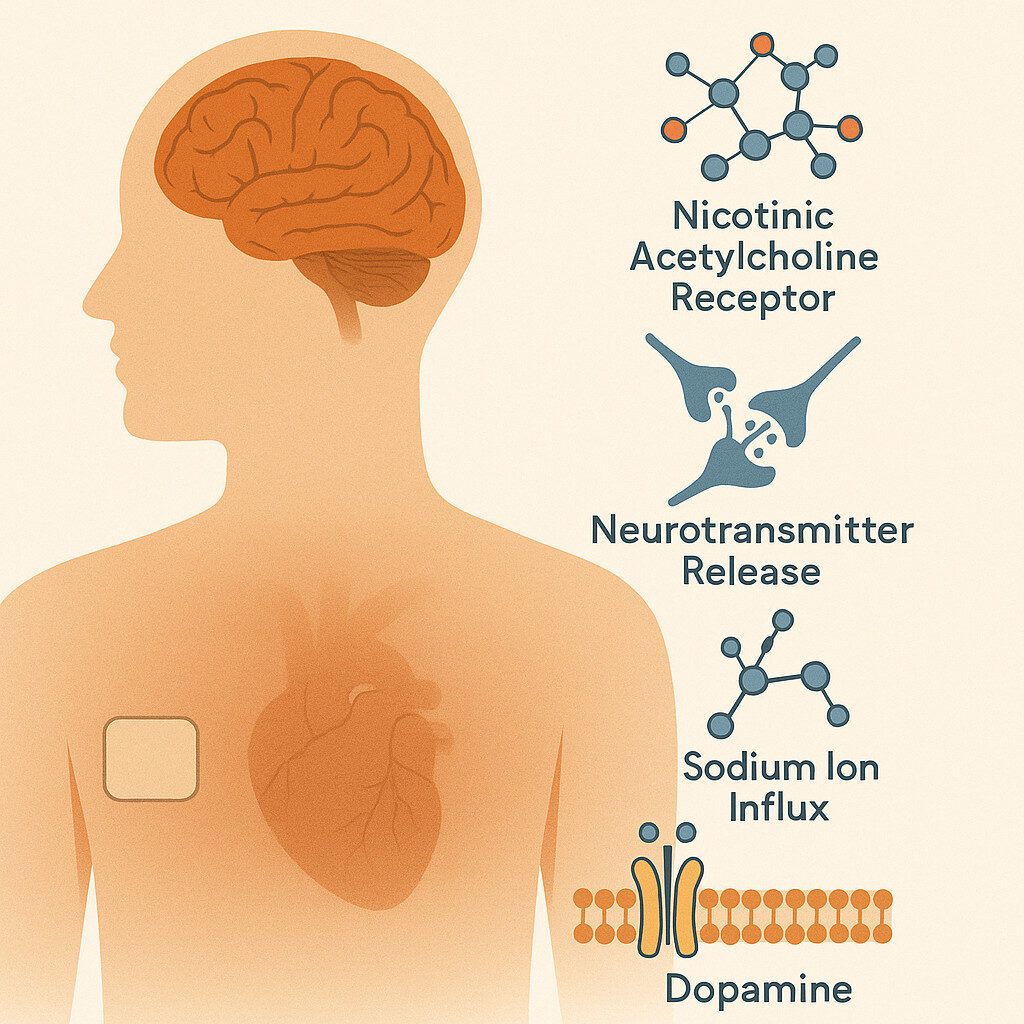What if nicotine was actually good for us? There is rising evidence that it can be certainly very helpful in brain health and immune health. Let’s dive into some details!
Nicotine, via a transdermal patch, is absorbed steadily through the skin, bypassing going through the liver. This delivery allows for a controlled, sustained release into the blood and then it acts on nicotinic acetylcholine receptors (nAChRs), which are widely distributed throughout the nervous system.
Mode of Action via the nAChRs
Induces influx of sodium and calcium ions .. which does the following:
- Stimulates dopamine release in the nucleus accumbens (reward and pleasure)
- Enhances norepinephrine output (increased focus and arousal)
- Modulates acetylcholine and glutamate levels (improves memory and cognition)
- Increases serotonin activity (supports mood regulation)
- Activates the cholinergic anti-inflammatory pathway on immune cells (balance immune)
- Stimulates adrenal gland to release epinephrine (mild stimulant effect = energy)
- May reduce proinflammatory cytokines (e.g., TNF-α, IL-6) These typically make you feel sick when you have an infection.
Brain Benefits:
Nicotine has been extensively studied for its neuroactive properties, especially for attention, cognition, and neurological disorders. By activating nAChRs, nicotine enhances the release of several key neurotransmitters, including dopamine, acetylcholine, glutamate, and serotonin, which contribute to increased alertness, improved working memory, and faster information processing.
The stimulation of other receptors in the prefrontal cortex supports attention and executive function, and those in the hippocampus are linked to improved memory consolidation. This means it helps one make decisions, execute tasks, and have a better working memory.
These mechanisms make nicotine of interest in the treatment of many cognitive disorders. The following have been researched to benefit positively for many years: Alzheimer’s disease, Parkinson’s disease, ADHD, Autism and schizophrenia. Some studies have shown that nicotine may exert neuroprotective effects by reducing beta-amyloid toxicity, decreasing oxidative stress, and modulating neuroinflammation through immune cell regulation. Furthermore, the anti-inflammatory properties of nicotine have shown potential in protecting brain tissue from chronic inflammation-driven damage. This is very well established research and should be considered in every case to be a viable treatment.
While nicotine must be used with caution due to side effects of nausea and vomiting, isolated therapeutic use (e.g., via patch or controlled dosing) continues to be explored for its potential to support brain health, particularly in degenerative or inflammatory neurological conditions. If side effects occur, simply reduce the dose.
Immune Benefits – The COVID connection:
Nicotine could be used for Long Covid or other chronic inflammatory post viral syndromes. A 2021 paper (Farsalinos et al.) proposed that SARS-CoV-2 may bind to nAChRs, disrupting vagus nerve signaling and triggering ‘cytokine storms’. So when nicotine patch is applied, nicotine would replace that virus particle that is sitting in the receptor and have the positive effects of calming down the excessive inflammation, relieving the brain fog and positively stimulating the nervous system and brain to function better.
I would recommend finding a naturopath who is understanding of this mode of treatment to help guide you along the way. We offer free 15 minute consults in our office. Please feel free to reach out with questions.


